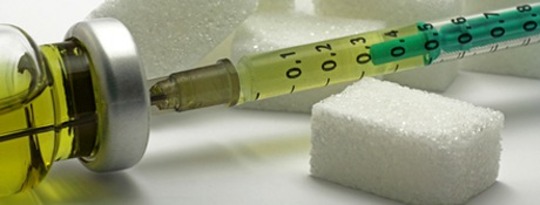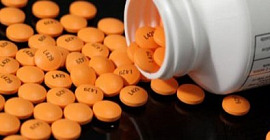
A hormone called betatrophin prompts cells in the pancreas to multiply and produce more insulin. The finding, in mice, may lead to new ways to prevent or slow the progression of diabetes.
Diabetes is a disorder in the use of glucose, a sugar that serves as fuel for the body. When blood glucose levels rise, beta cells in the pancreas normally make the hormone insulin, which signals cells to take sugar from the blood. In type 1 diabetes, the body’s own immune system attacks and destroys beta cells. In type 2 diabetes, the most common form of diabetes, cells lose their sensitivity to insulin, and beta cells can’t make enough insulin to keep blood sugar levels in check. Over time, high levels of glucose can lead to heart disease, stroke, blindness and other problems.
Insulin-secreting beta cells comprise just 1% of a normal pancreas and normally divide very slowly. Drs. Peng Yi, Douglas A. Melton and colleagues at the Harvard Stem Cell Institute reasoned that, while the causes for type 1 and type 2 diabetes differ, treatments that encourage beta cells to multiply could benefit patients with both types of diabetes.
Previous studies found that, when insulin signaling is blocked in tissues such as the liver, beta cells multiply and increase insulin secretion. The researchers therefore used a molecule that binds the insulin receptor to interfere with insulin signaling.
Get The Latest By Email
The scientists confirmed that blocking the insulin receptor caused insulin resistance and stimulated beta cell proliferation in mice. When they analyzed gene expression, they identified a gene that was upregulated after the treatment by about 4-fold in liver and 3-fold in white fat. The gene produces a protein that the scientists dubbed betatrophin.
 The gene for an equivalent human protein is very similar. While betatrophin is expressed in the liver and fat of mice, in people it’s primarily expressed in the liver. The hormone is secreted into the bloodstream to signal beta cells in the pancreas to reproduce.
The gene for an equivalent human protein is very similar. While betatrophin is expressed in the liver and fat of mice, in people it’s primarily expressed in the liver. The hormone is secreted into the bloodstream to signal beta cells in the pancreas to reproduce.
To test the effects of betatrophin in the body, the researchers injected the betatrophin gene into mouse livers. After 8 days, beta cells in these mice filled 3 times more space in the pancreas than in control-injected mice, and pancreas insulin content doubled. The mice also had a lower fasting glucose level and improved glucose tolerance compared to control mice.
The researchers now aim to make betatrophin protein and test it directly by injection. They are working with 2 biotech and pharmaceutical companies to move the newly discovered hormone toward the clinic.
If this could be used in people,” Melton says, “it could eventually mean that instead of taking insulin injections 3 times a day, you might take an injection of this hormone once a week or once a month, or in the best case maybe even once a year.
by Harrison Wein, Ph. D.
- http://www. nih. gov/researchmatters/september2008/09082008insulin.
- http://www. nih. gov/researchmatters/april2012/04092012insulin.
- http://diabetes. niddk. nih.
- http://ndep. nih.
2013 Apr 24. pii: S0092-8674(13)00449-2. doi: 10. 1016/j. cell. 2013. 04. 008. Epub ahead of print]. PMID: 23623304.
NIH’s National Institute of Diabetes and Digestive and Kidney Diseases (NIDDK) and the Harvard Stem Cell Institute.










